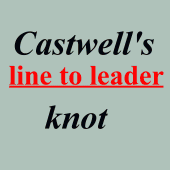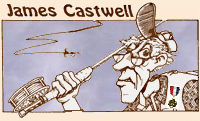|
May 4th, 1998
LINE-TO-LEADER
Those of you who join us in the 'chat-room' know that of the
many subjects discussed, the question of which knot is best for
tying the leader to the line comes up often. I think it is a type of
evolution process. Many started with a barbed ring-eye connection
sold for the old hollow silk lines. Trying to stick it up the new
solid-core lines was almost impossible, but some got it done.
As we develop in the sport we learn more ways to fiddle with
things and the leader-line knot is no exception. What follows is my
own opinion; not to be confused with fact or truth. Just what works
for me. Some of what follows is sure to bring wrath upon me, but I
am used to it.
The loop-to-loop connection, (in my opinion, remember) is the
worst possible connection ever! It is an accident waiting to happen.
Most are not applied right, the line is burned trying to shrink the
tube on, they soak up water, they hinge, and under enough pull
they can come off. Not bad credentials, huh? Oh sure, you can
change leaders fast. High price to pay for that feature; how often
do you change leaders anyhow? Buy the fly-line with the loop
already installed? I think not; do you KNOW who tied it on? I like
to do my own knots, thank you.
Ok, the nail knot, used by everybody, right? Wrong... Not by
me. Remember, the nail-knot depends on the coating of the fly line
NOT pulling off of the core of the fly line! So you want to make sure
that does not happen? Crank down on the knot when you tie it,
right? Wrong again! That takes the chance of fracturing the
coating, starting the process of failure.
How about a knot that is as fast as a loop-to-loop, no bigger
than one, gets tighter the harder you pull, won't cut itself, (for me,
remember) has NOT FAILED in fifty years! Sound like a winner?
Why have you never heard of it? What book is it in? What is it
called? Who invented it? I don't know! But, here it is.
1. Tie a loop in the butt end of a new leader. If it had one
already, use it. Hold the loop between the thumb and fore-finger of
the left hand; loop sticking out to the right.
2. Place the end of the fly line (from the top-right side) OVER
the loop, pointing down to the left now. The line is now in YOUR
side of the loop; not behind it, nor through it. It's just on top of it.
Have about one inch of line extending down to the left below the
loop.
3.Take the end of the LINE up behind the leader, then toward
you, over the top of the top of the loop, over the line and DOWN
THE HOLE BETWEEN THE LINE AND THE BOTTOM OF THE LOOP.
This is the critical step. Do not change or try to improve on any of
these steps.
4. Most important now; pull ONLY on the fly-line, not the stub
hanging down. Do not pull on both. You may squiggle things a bit to
ease the line back so as not to use hardly any fly line at all.
5. Pull the knot tight. Roll it a bit with your thumb and finger,
pull it again and it is done.

Now, my apologies to those of you who are gnawing at your
keyboards getting ready to explain to me about how little I know.
I do admit that for small light fly gear, the nail-knot, and similar
types are fine. This knot is for fish that will pull out some backing,
Ok? In fact with a 8-foot rod and a 16 foot leader the knot will hit
the tip-top and most of the line guides on the way in when landing
a trout. The truth is, I use this knot on ALL my leaders, 3wt to
9wt.
The name? I have heard: Albright, half-Albright, dally-knot; so
far, I have not found it in any book. I am sure it is, I just have
never found it. The thing is, it WORKS! But, I still don't know what
is.
WINNER OF THE "NAME THE CAST CONTEST" after
hours of intense head-scratching is Al Campbell with the following
entry: " I'll call it the "back-loop dropper cast". This cast is
designed to let the fly fisher fish the water in front AND back of
him or her. Guaranteed to double your fishing time in just a few
short hours. It might even increase your catch ratio, but I wouldn't
count on it." Watch the mail Al for your probably valuable prize! ~ JC
Addendum: 11/20/00 A reader sent us pictorial evidence this knot
has gone by the name of 'LAP Knot,' originally having been used in
Lapland. Specifically, this is a left hand version. The simplicity
of this knot leads me to believe it must have been known by other
names as well over the eons of human development. If you find yet
more information on this, please contact me. JC
Addendum 2: Comes now this. A strong belief from a reader in Reykjavik,
Iceland that this knot was known as a 'Flag Knot,' (fanahnutur) used
by him as a youngster in the Boy Scouts when attaching a flag. More
names? Keep them coming. JC
Till next week, remember ...
|


